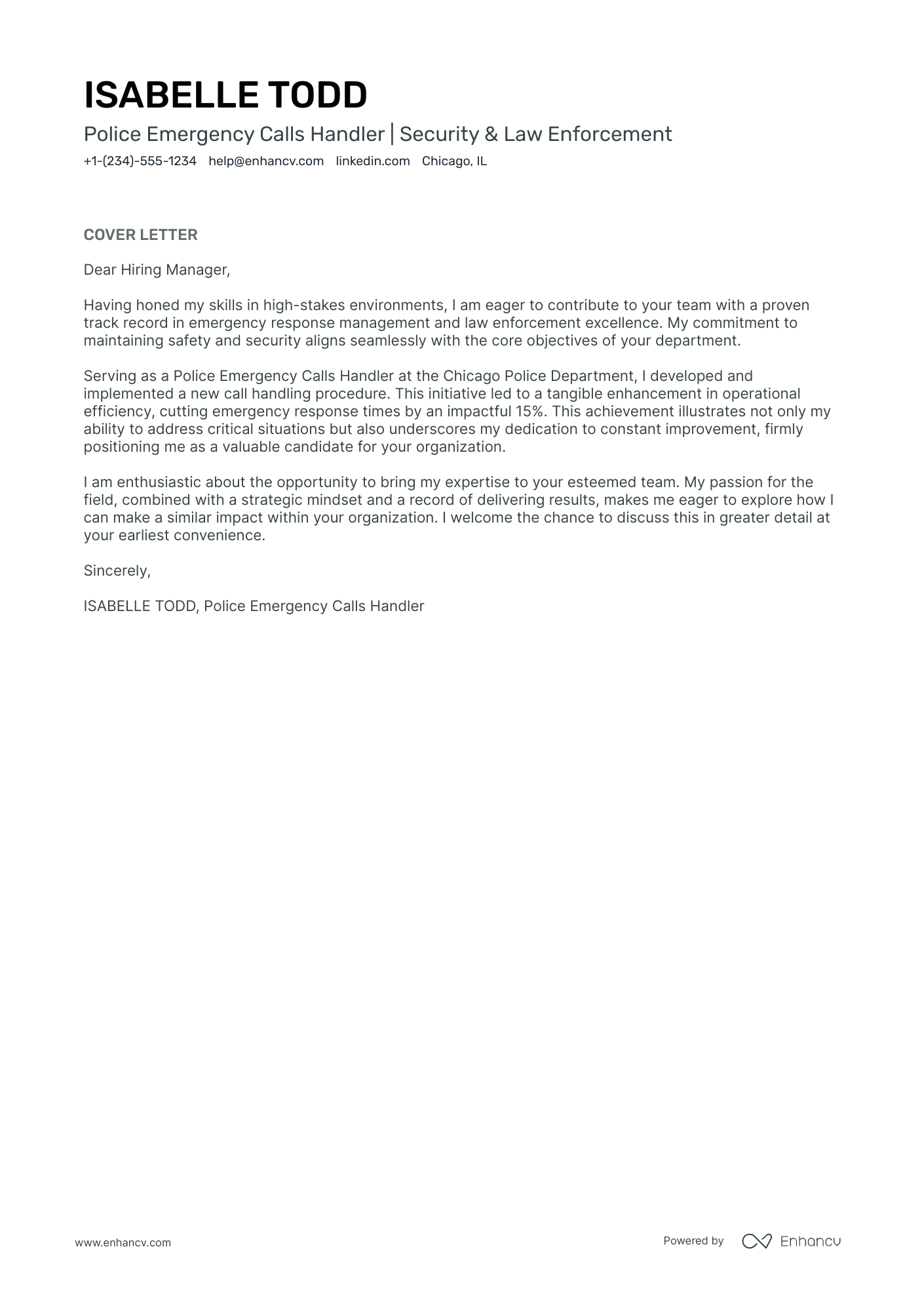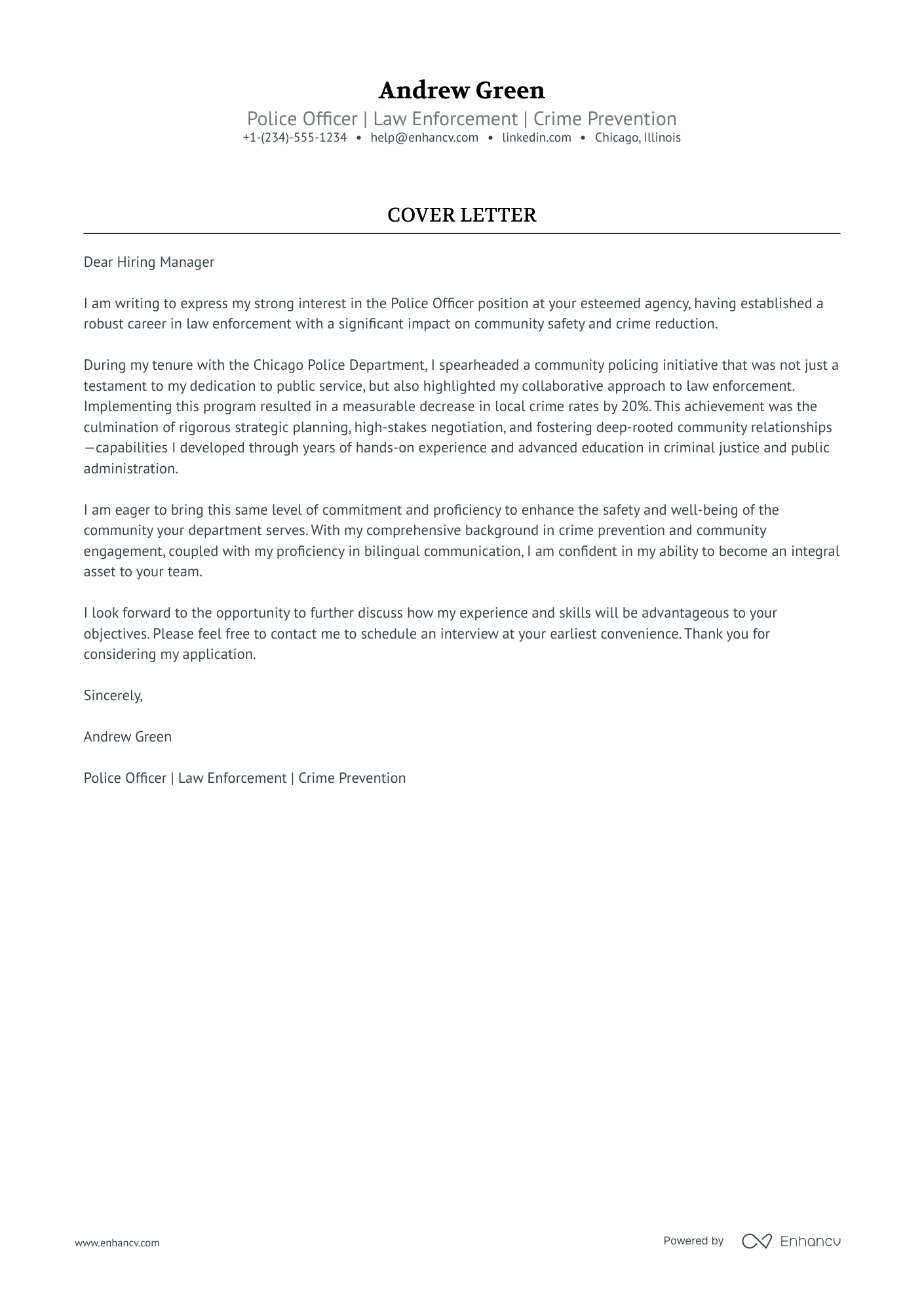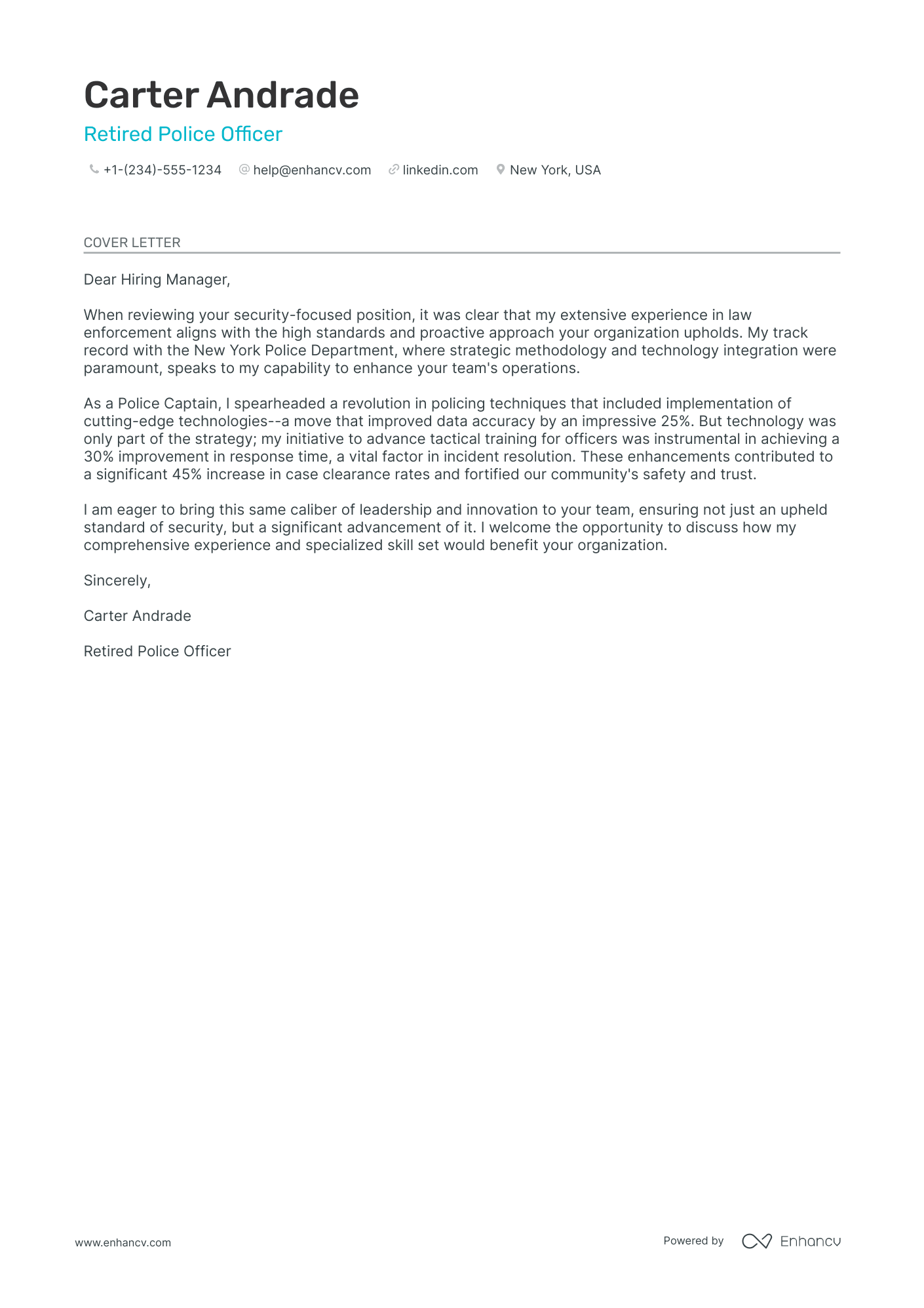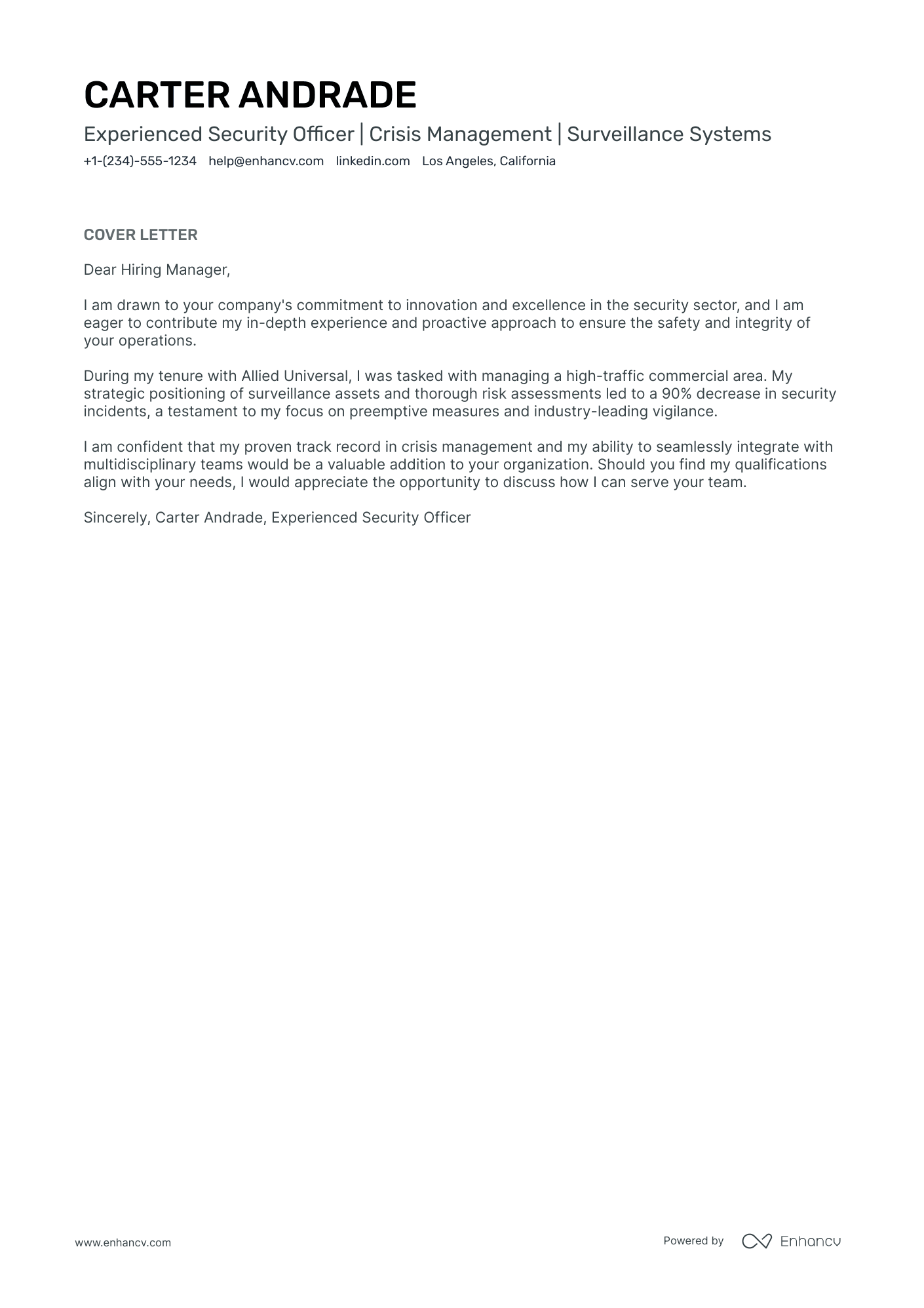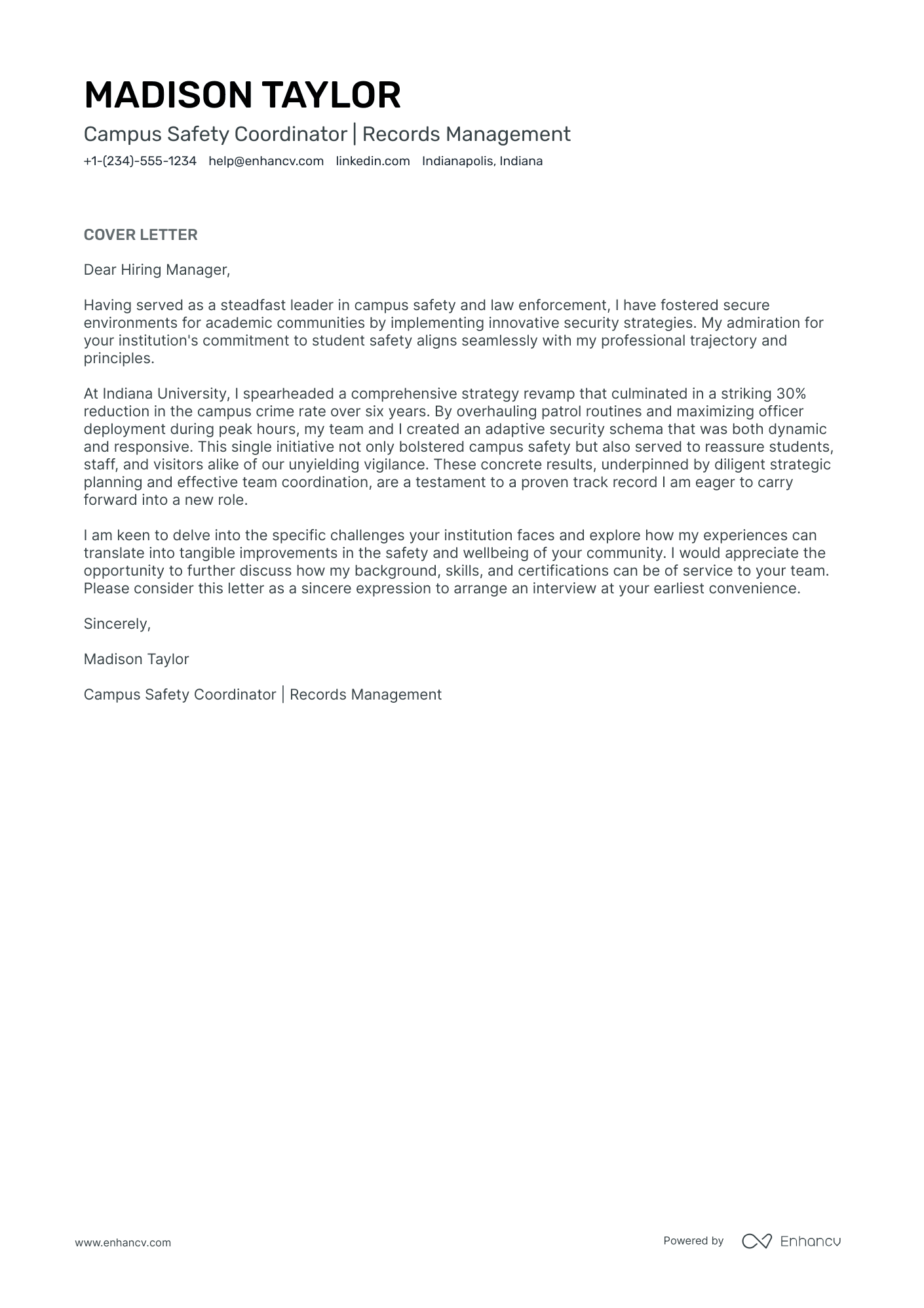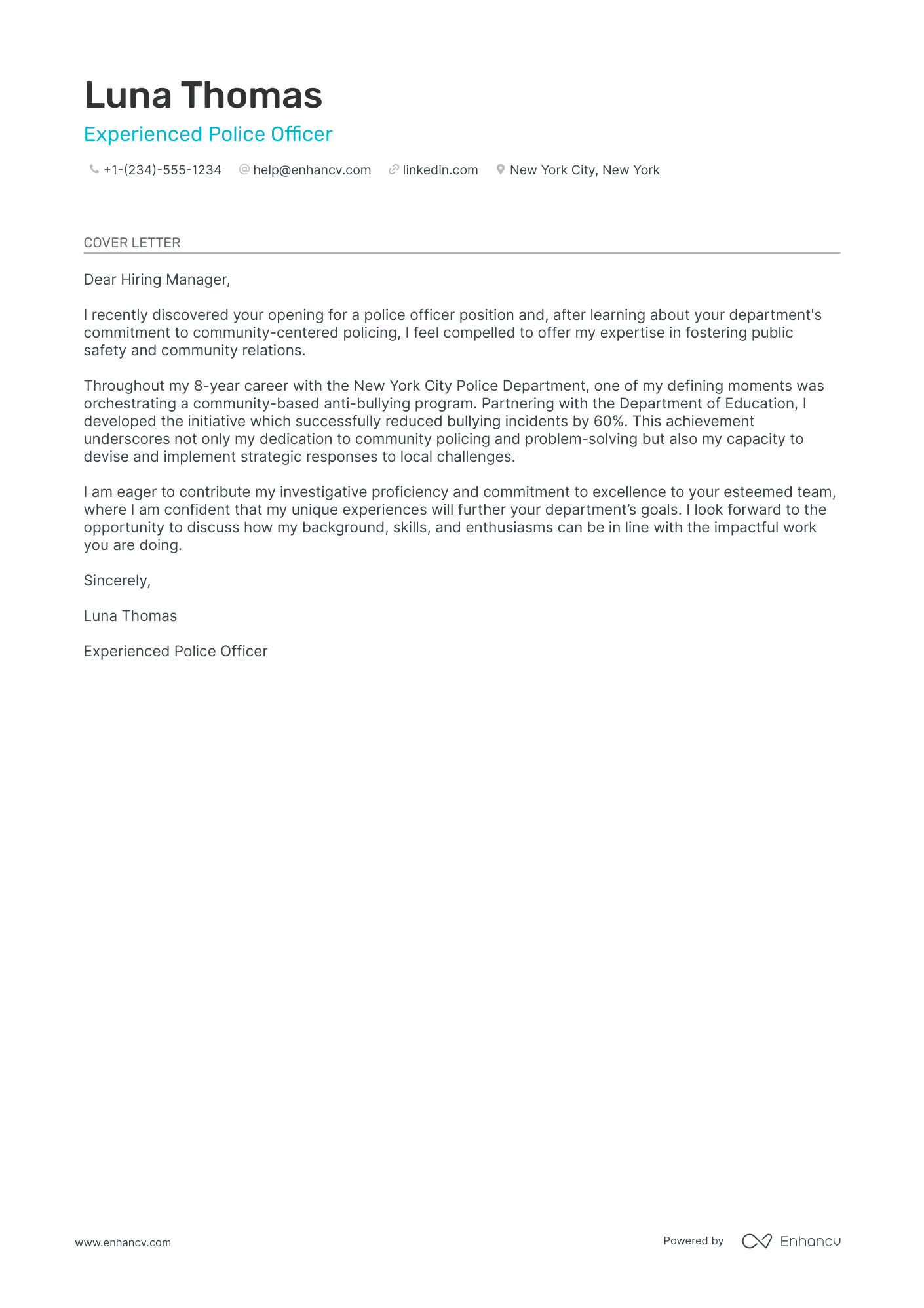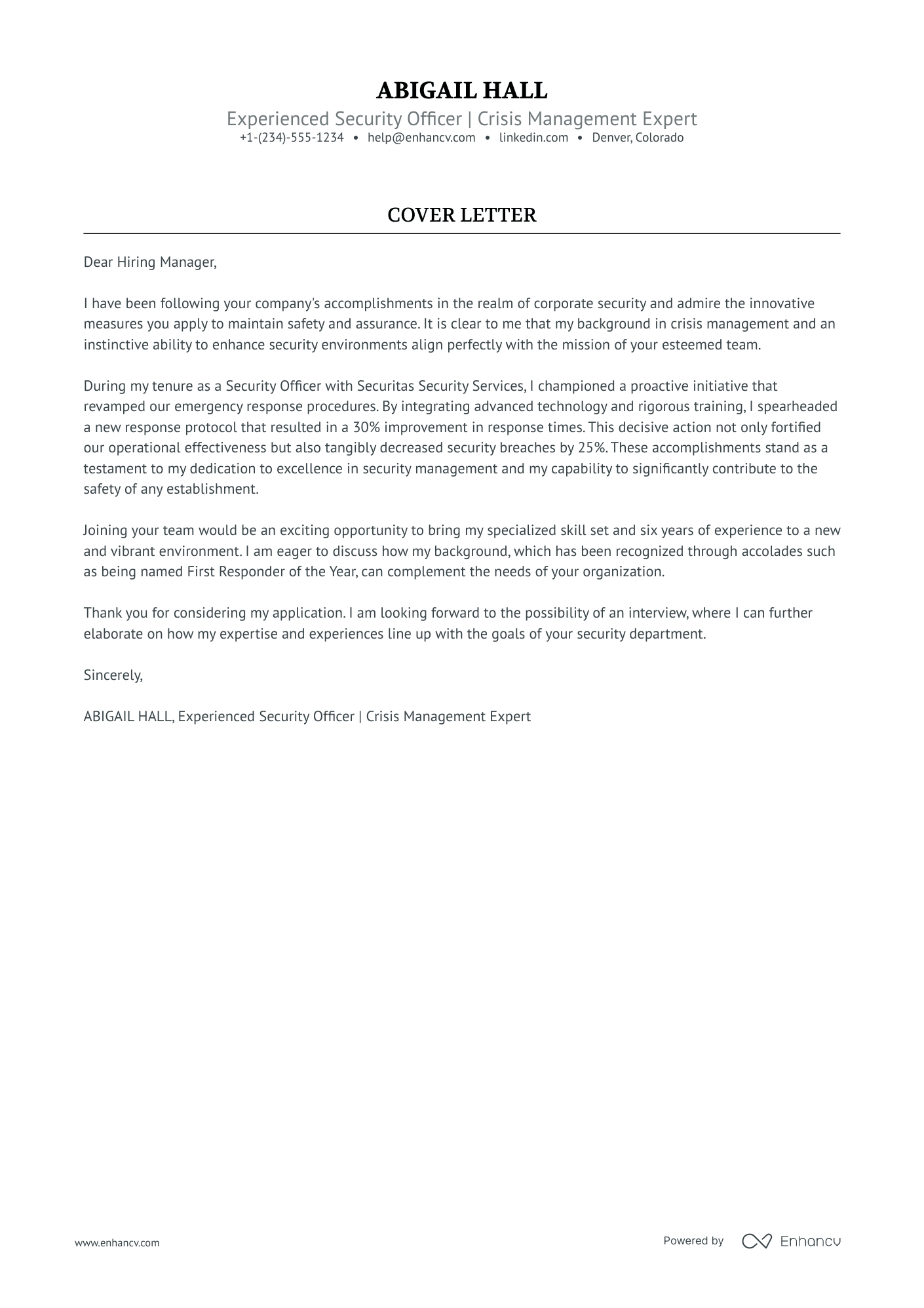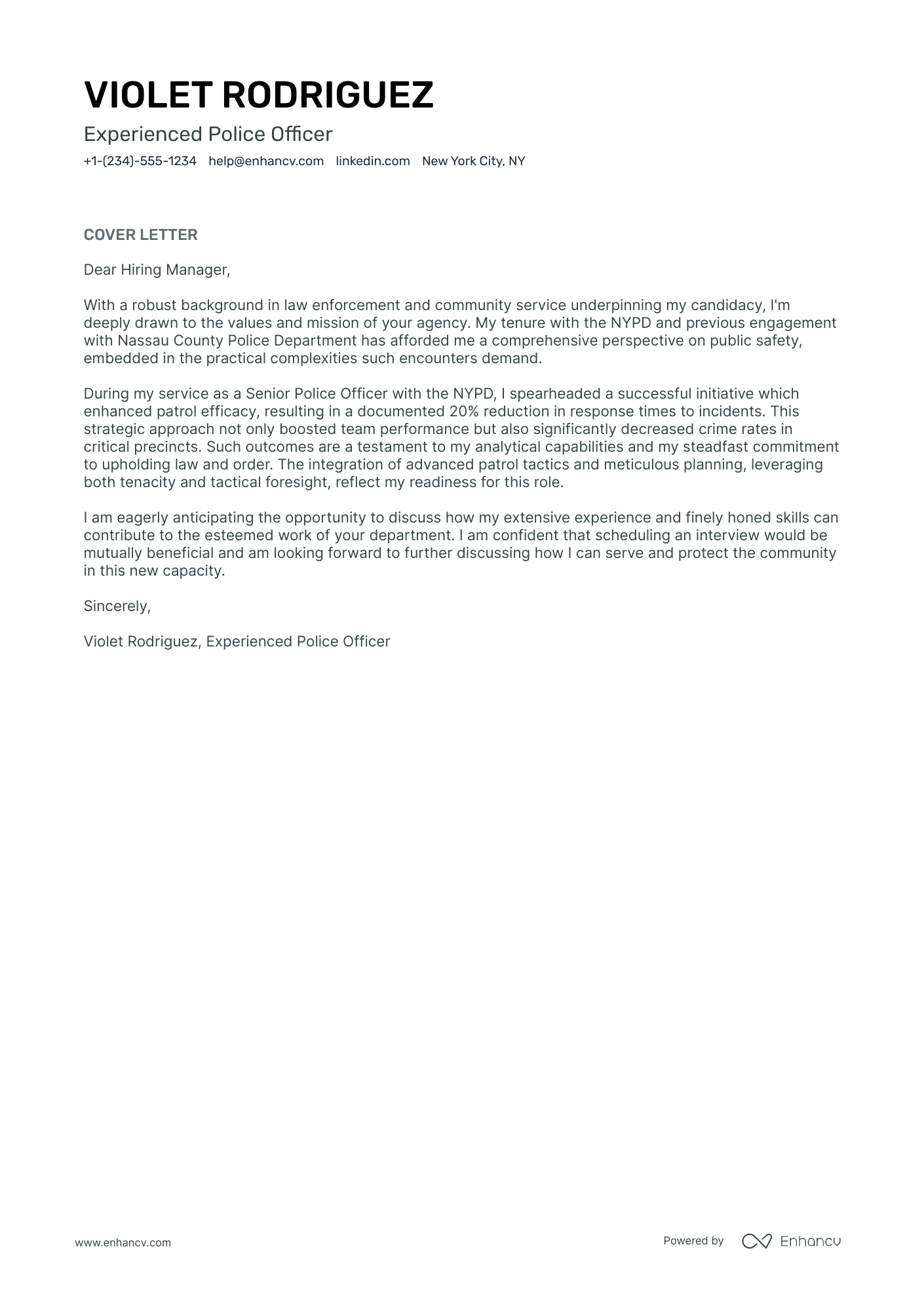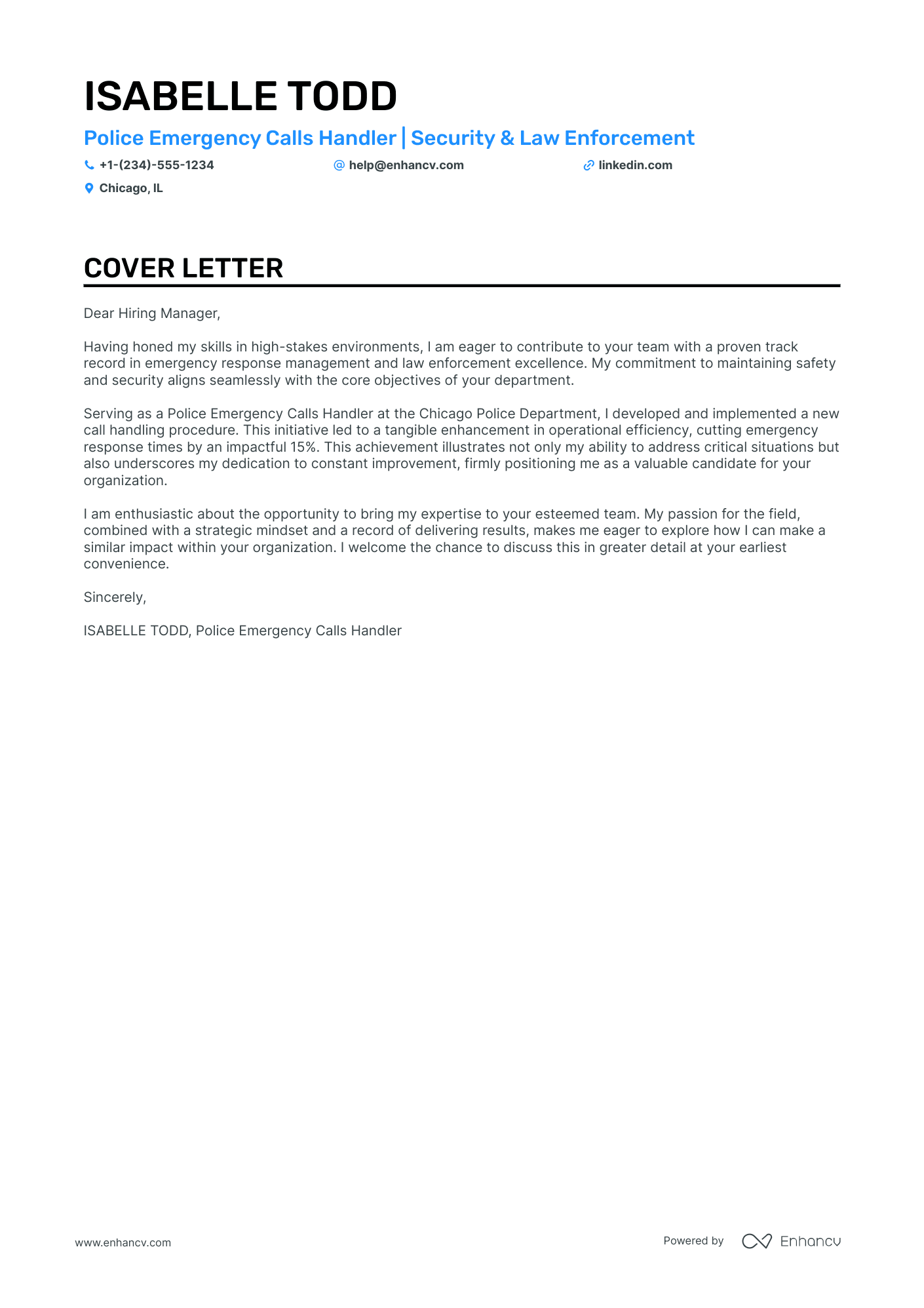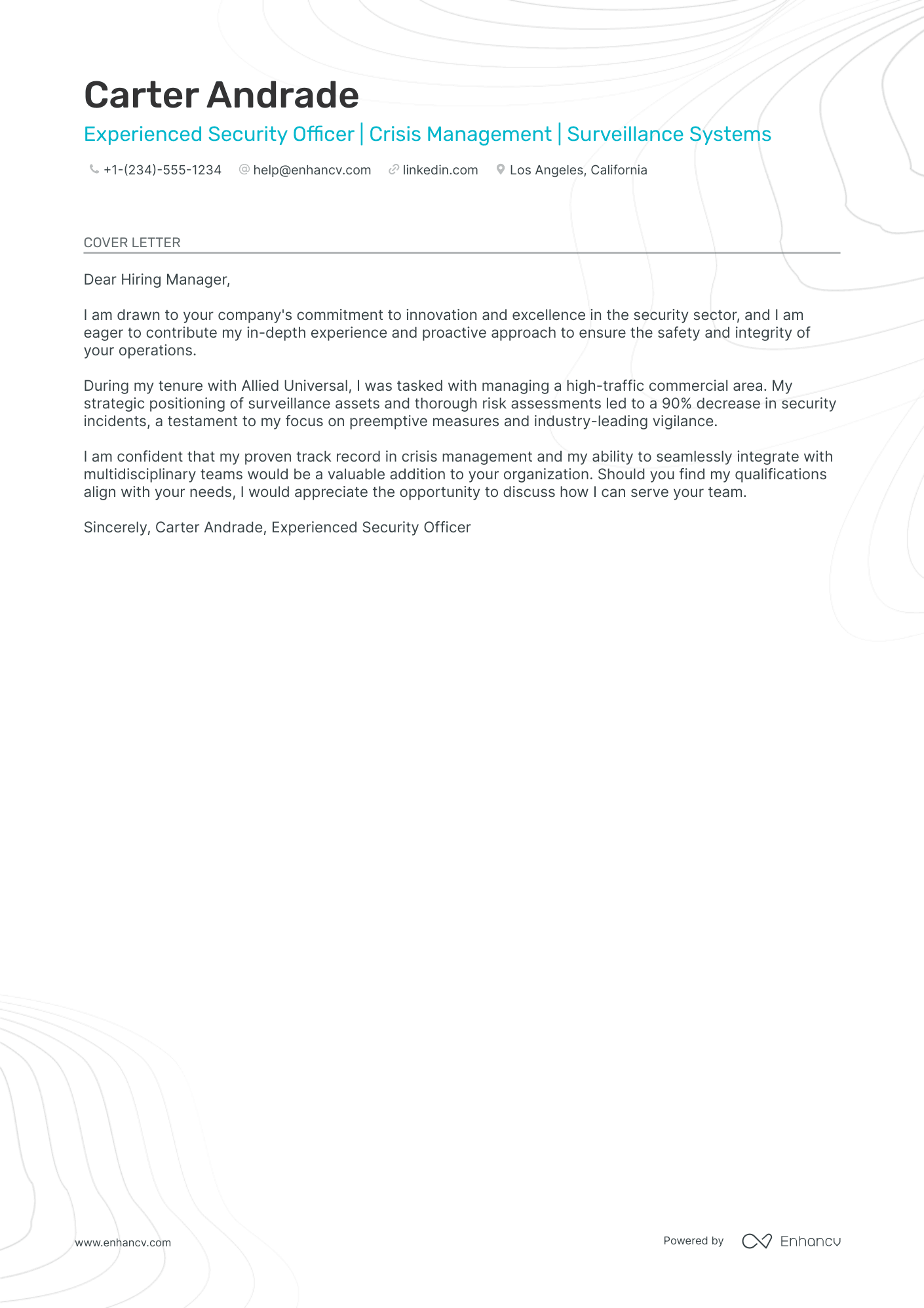Crafting a standout police officer cover letter can be a hurdle if you've already jumped into the job application process, only to realize a gripping cover letter is part of the checklist. It's your chance to highlight a crowning professional achievement, telling its story without echoing your resume. Striking a balance between formality and originality, while axing the clichés and keeping it to one page, can feel like a tightrope walk – but it's one you can master.
- Including all the must-have paragraphs in your structure for an excellent first impression;
- Learning how to write individual sections from industry-leading cover letter examples;
- Selecting the best accomplishment to tell an interesting and authority-building professional story;
- Introducing your profile with personality, while meeting industry standards.
And, if you want to save some time, drag and drop your police officer resume into Enhancv's AI, which will assess your profile and write your job-winning cover letter for you.
If the police officer isn't exactly the one you're looking for we have a plethora of cover letter examples for jobs like this one:
- Police Officer resume guide and example
- Retired Police Officer cover letter example
- Volunteer Firefighter cover letter example
- Wildland Firefighter cover letter example
- Public Safety Officer cover letter example
- Incident Manager cover letter example
- Investigator cover letter example
- Fraud Investigator cover letter example
- Firefighter cover letter example
Drop your resume here or choose a file.
PDF & DOCX only. Max 2MB file size.
Police officer cover letter example
BENJAMIN GARCIA
Dallas, Texas
+1-(234)-555-1234
help@enhancv.com
- Proven Track Record: The cover letter emphasizes the candidate's successful history of enhancing safety protocols and protecting assets, suggesting that the candidate is experienced and has a track record of measurable achievements.
- Quantifiable Achievements: Mentioning specific metrics, such as the 45% decrease in unauthorized entries and reduction of operational costs by 20%, provides concrete evidence of the candidate's effectiveness and efficiency in their previous role.
- Leadership and Team Management: The capacity to lead a team of 25 officers highlights the candidate's leadership skills and the ability to handle responsibility, which is crucial for a senior position in security management.
- Alignment with the Organization's Needs: The willingness to discuss how the candidate's experience and skills align with the organization's operational requirements suggests a tailored approach and an understanding of the company’s specific security challenges.
Standard formatting for your police officer cover letter
Structure your police officer cover letter, following industry-leading advice, to include:
- Header - with your name, the role you're applying for, the date, and contact details;
- Greeting - make sure it's personalized to the organization;
- Introduction paragraph - no more than two sentences;
- Body paragraph - answering why you're the best candidate for the role;
- Closing paragraph - ending with a promise or a call to action;
- Signature - now that's optional.
Set up your police officer cover letter for success with our templates that are all single-spaced and have a one-inch margin all around.
Use the same font for your police officer cover as the one in your resume(remember to select a modern, Applicant Tracker System or ATS favorites, like Raleway, Volkhov, or Chivo instead of the worn-out Times New Roman).
Speaking of the ATS, did you know that it doesn't scan or assess your cover letter? This document is solely for the recruiters.
Our builder allows you to export your police officer cover letter in the best format out there: that is, PDF (this format keeps your information intact).
Skip the hassle of writing a cover letter. Use our free cover letter generator and get it done in moments.
The top sections on a police officer cover letter
- Header: This section should include the applicant's contact information, the date, and the recipient's details, ensuring a professional appearance and making it easy for the hiring manager to file and respond to the application.
- Introduction: The opening paragraph should immediately capture the hiring manager's attention by succinctly stating the police officer position being applied for and expressing the applicant’s passion and understanding of law enforcement responsibilities.
- Law Enforcement Experience and Skills: In this section, the applicant should highlight their relevant law enforcement experience, specialized training, and specific skills that directly align with the duties of a police officer, demonstrating credibility and preparedness for the role.
- Community Involvement and Values: The candidate should showcase any community service or volunteer work that reflects their commitment to public service and aligns with the values and community-oriented approach of contemporary policing.
- Closing and Call to Action: The final section should express gratitude for the opportunity to apply, reiterate the applicant's enthusiasm for contributing to the police department, and include a call to action, inviting the hiring manager to arrange an interview to discuss the candidate's qualifications further.
Key qualities recruiters search for in a candidate’s cover letter
- Integrity and Ethics: Police officers are entrusted with upholding the law and protecting the citizens they serve, making a strong moral character essential for the credibility and trustworthiness of the role.
- Conflict Resolution Skills: Officers routinely handle disputes and potentially volatile situations, requiring the ability to de-escalate conflicts and negotiate peaceful outcomes.
- Physical Fitness: The job can be physically demanding, necessitating strength, endurance, and agility for pursuits, arrests, and maintaining public safety.
- Communication Skills: Effective communication is crucial for reporting incidents, testifying in court, and engaging with the community to build rapport and gather information.
- Experience with Law Enforcement Techniques: Knowledge of proper procedures, legal guidelines, and tactical skills ensures the officer can perform duties effectively and within the bounds of the law.
- Commitment to Community Service: A dedication to serving and protecting the community demonstrates the officer’s understanding of the role’s civic responsibility and connection to the public.
What greeting should you use in your police officer cover letter salutation
A simple "Hello" or "Hey" just won't work.
With your police officer cover letter salutation, you set the tone of the whole communication.
You should thus address the hiring managers by using their first (or last name) in your greeting.
But how do you find out who's recruiting for the role?
The easiest way is to look up the role on LinkedIn or the corporate website.
Alternatively, you could also contact the organization via social media or email, for more information.
Unable to still obtain the recruiter's name?
Don't go down the "To whom it may concern path". Instead, start your cover letter with a "Dear HR team".
List of salutations you can use
- Dear Hiring Manager,
- Dear [Department Name] Selection Committee,
- Dear Chief [Last Name],
- Dear Lieutenant [Last Name],
- Dear Sergeant [Last Name],
- Dear Captain [Last Name],
Your police officer cover letter intro: showing your interest in the role
On to the actual content of your police officer cover letter and the introductory paragraph.
The intro should be no more than two sentences long and presents you in the best light possible.
Use your police officer cover letter introduction to prove exactly what interests you in the role or organization. Is it the:
- Company culture;
- Growth opportunities;
- Projects and awards the team worked on/won in the past year;
- Specific technologies the department uses.
When writing your police officer cover letter intro, be precise and sound enthusiastic about the role.
Your introduction should hint to recruiters that you're excited about the opportunity and that you possess an array of soft skills, e.g. motivation, determination, work ethic, etc.
How to write an achievement-focused police officer cover letter body
We've got the intro and greeting covered. Now, comes the most definitive part of your police officer cover letter - the body.
In the next three to six paragraphs, you'd have to answer why should recruiters hire you.
What better way to do this than by storytelling?
And, no, you don't need a "Once upon a time" or "I started from the bottom and made it to the top" career-climbing format to tell a compelling narrative.
Instead, select up to three most relevant skills for the job and look back on your resume.
Find an achievement, that you're proud of, which has taught you these three job-crucial skills.
Quantify your accomplishment, using metrics, and be succinct in the way you describe it.
The ultimate aim would be to show recruiters how this particular success has built up your experience to become an invaluable candidate.
Time to wrap up your police officer cover letter
Writing the closing paragraph of your police officer cover letter is just as important as the salutation.
You have to make it personalized to the job advert and recruiter.
Experienced professionals advise candidates to end with a request or reminder for follow-up. Write that you're grateful for the opportunity, and, at the same time, hint that you're available for the next steps of the process.
Otherwise, you could also conclude your police officer cover letter by facing the future. How do you see yourself, as part of the team? In particular, how would you settle in your new role in the first six months to a year?
Addressing limited to no experience in the police officer cover letter
There's nothing to worry about if you lack professional experience.
Your police officer cover letter could bridge the gaps in your professional history by focusing on what matters most to recruiters, that's either:
- skills - focusing on transferable ones you've gained, thanks to your life experience (e.g. volunteering, certificates, etc.);
- achievements - select the most relevant and noteworthy one from your history (e.g. education, projects, etc.);
- motivation - describe how you envision your professional growth in the next up to five years, thanks to this opportunity.
Key takeaways
Turning your police officer cover letter into a success is all about staying authentic to yourself and relevant to the job:
- Be creative with your police officer cover letter introduction by stating something you enjoy about the company (that is genuine) or about your skill set (to get the recruiters' interested);
- Use single spacing and have a one-inch margin wrapping all around the content of your police officer cover letter;
- Select just one past achievement from your career or life to tell a story of how you've obtained job-crucial skills and how they'd be beneficial to the role;
- The finishing paragraph of your police officer cover letter doesn't necessarily have to be a signature but could be a promise of what you plan to achieve in the role;
- Instead of focusing on your lack of experience, spotlight your transferable skills, one relevant achievement, and career dreams.
Police Officer cover letter examples
By Experience
Entry-Level Police Officer
Experienced Police Officer
By Role
